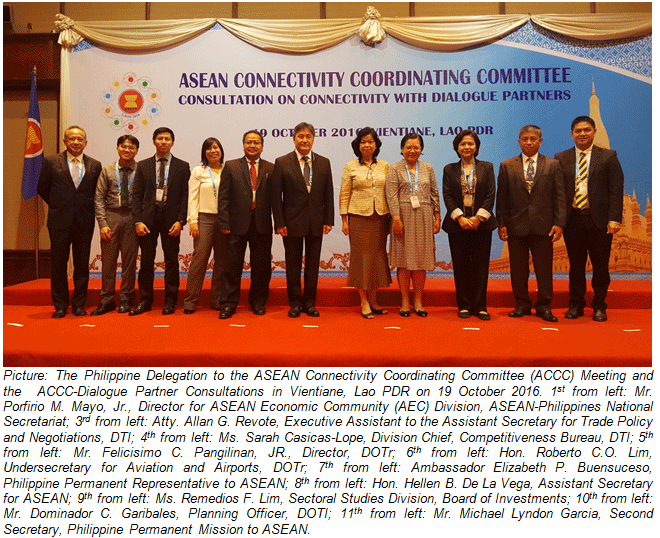
To underscore the importance to the Philippines of the new Master Plan on Connectivity (MPAC 2025), the Philippines sent a power team to attend the ASEAN Connectivity Coordinating Committee (ACCC) Meeting and the Consultation on Connectivity with Dialogue Partners, held in Vientiane, Lao PDR on 19 October 2016. The Philippine delegation was led by Ambassador Elizabeth P. Buensuceso, Philippine Permanent Representative to ASEAN. DOTr Undersecretary for Aviation and Airports, Roberto C.O. Lim, and Assistant Secretary for ASEAN, Hellen B. De La Vega, also attended the two Meetings. They also attended the 7th ASEAN Connectivity Symposium, held on 20 October 2016.
During the course of the ACCC Meeting, Ambassador Buensuceso underscored the importance on the completion of the remaining action lines of MPAC 2010 into the new MPAC 2025 by their respective lead sectoral bodies. Ambassador Buensuceso also stressed the importance of the clear delineation of roles between the ACCC, National Coordinators (NCs) and National Focal Points (NFPs) at the sectoral level towards the implementation of MPAC 2025, with a view to foster interaction and coordination among the NCs and NFPs at the sidelines of the ACCC, through the development and finalization of their respective Terms of Reference (TORs), taking into account the particular circumstances of each ASEAN member state.
The meeting also discussed the introduction of a “rolling pipeline” of infrastructure projects, as well as modalities towards the facilitation and evaluation of MPAC 2025 initiatives, including through the conduct of workshops in collaboration with respective sectoral bodies, for the development of concept notes for the fifteen (15) key initiatives of MPAC 2025 to be in alignment with respective national development plans, as well as the identification of a lead implementing body for the strategic area of Sustainable Development.
During the second day, the ACCC met with the ten (10) ASEAN Dialogue Partners to discuss innovative ways to further utilize ASEAN’s external partnerships, including through the funding of workshops and studies, towards greater connectivity within ASEAN. END

